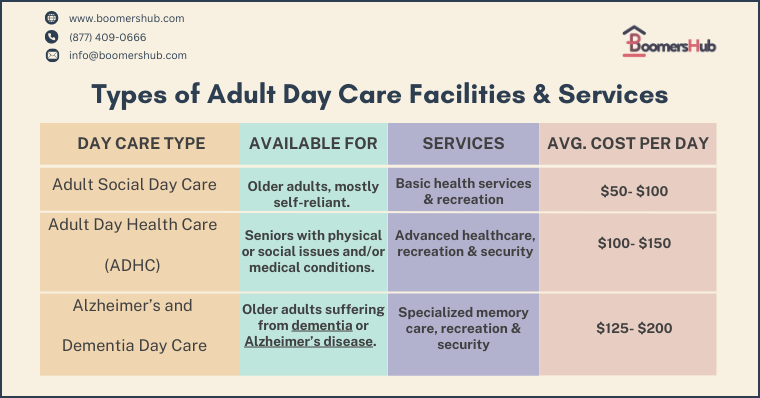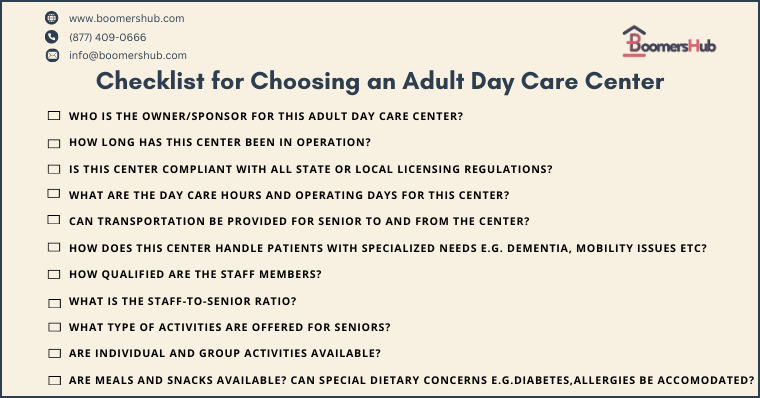We love the seniors in our family but there are times when we feel guilty for poorly juggling between our personal lives and providing them with the support that they deserve. The strong hands that have guided us have become childlike as it’s their turn to be nurtured and protected.
The solution? Consider adult day care centers, where your elderly can receive help with activities of daily living to specialized care for dementia while they can still have an iron-grip on their independence. Yep, these centers are babysitters for adults.
What Is Adult Day Care Center?
An adult day care center is a solution for seniors to get the care and supervision that they need each day from licensed professionals in a safe environment. The elders can have an enriched social life with people of similar age at this center, receive counselling, enjoy cooked meals etc., at these adult day centers.
For many, employing live-in caregivers can be expensive and boring for your seniors to stay at home all day. For family members and caregivers, working full-time, or needing some time away from home, these kinds of centers can bring a peaceful sigh of relief.
What Are the Benefits of Adult Day Care?
According to the National Center for Health Statistics, there are a total of 4130 adult day care centers. An Oxford study in 2017 found that seniors who enter Adult Day Care centers experienced significant improvement in their lives.
Here are the holistic benefits of adult day care:
- These centers are an all-in-one solution for seniors offering health, therapy(for mental health concerns) and social services.
- Seniors get the chance to connect with people of similar age and life experience. This reduces the social isolation adults tend to feel with age.
- Medication management and health care is available for all – especially for those with special needs like diabetes or are suffering from cognitive impairment such as dementia.
- For caregivers, experiencing burnout is quite common and it should not be a matter of shame for you, or your senior loved one. It is also natural to take time for yourself and other equally important tasks. Having a day care center for adults can let you relax, knowing your senior is in safe hands.
Types of Adult Day Care Facilities and Their Services
Before choosing a daycare center, it is best to analyze what type of care the senior requires, and the type of support needed by their caregivers. If situation demands, you may have to keep senior living options like assisted living, nursing homes and memory care in mind too.
Here are the 3 main types of day care facilities available for seniors:
1. Adult Social Day Care
Available for:
- Older adults, mostly self-reliant.
Services offered:
- Social skills enhancement and activities e.g. discussion groups, group exercises, and games.
- Boost individual abilities
- Recreation e.g. arts and literature
- Basic health related services
Average Cost Per Day:
- $50- $100.
2. Adult Day Health Care (ADHC)
Available for:
- Seniors with physical or social issues and/or medical conditions.
Services offered:
- Health monitoring by licensed professionals.
- Medicine management.
- Therapy services.
- Observation in safe settings.
Average Cost Per Day:
- $100- $150.
Difference between adult day care and adult day healthcare
Adult day healthcare has a stronger medical and rehabilitation focus, while adult day care is more oriented towards social activities and basic supervision for more independent adults.
3. Alzheimer’s and Dementia Day Care (Specialized Centers)
Available for:
- Older adults suffering from dementia or Alzheimer’s disease.
Services offered:
- High level of security
- Staff specialized in dementia care.
- Medicine management.
- Therapy services.
Average Cost Per Day:
- $125- $200.
General Services Provided By All Adult Day Care Centers
|
Category |
Services |
|
Health |
Health Checkups, Medical Assistance, Medication Management |
|
Therapy |
Exercise, Physical & Cognitive therapy |
|
Nutrition |
Meals Provided |
|
Social Activities |
Games & Recreation |
|
Safety |
Supervision available |
|
Caregiver Support |
Respite Care |
|
Support |
Counselling, Education |
|
Transport |
Available. |

Popular Adult Day Care Centers in 2024
Apart from preference and requirements, finding the best day centers will depend on your location. You can locate the most reputable centers in the country on National Adult Day Services Association (NADSA)’s website.
Here are this year’s day care centers for seniors that are popular all over the U.S.:
- Town Square Adult Day Care: This nationwide available center is famous for its 1950s-themed aesthetic, coupled with the latest treatment needed to care for seniors for their individual, social or mental health needs.
- SarahCare: This franchise facilitates medical care, recreation and holistic support for older adults to enjoy an immersive, community experience.
- ActivAge: A fun-themed adult day care center that is friendly and inclusive; giving seniors a relaxing and safe environment to receive care in.
- Active Day: Active Day has at least 100 centers across the country and is steadfast in adult day health services, customized day care plans, and stimulating activities that empower the independence of seniors.
Affordable adult day care options
Finding affordable adult day care that can soften the financial blow, but there are several avenues to explore:
- Local nonprofits and community organizations: Many local nonprofits offer subsidized adult day care services, often based on income. Check with community centers or aging services in your area.
- Government programs: Programs like Medicaid may cover adult day care costs for eligible individuals. Look into state-specific programs that provide financial assistance to seniors.
- Veterans’ benefits: For veterans, the VA offers programs that can help with adult day care expenses. It’s worth contacting your local VA office for more details.
- Caregiver support initiatives: Some states run initiatives aimed at easing the burden on family caregivers, which may include funding for adult day care services.
- Group discounts: Many centers offer discounts for enrolling multiple family members or for committing to long-term contracts. Always ask about potential savings.
- Scholarships and grants: Check with local organizations or foundations that may provide scholarships for seniors needing assistance with day care costs.
- Sliding scale fees: Some facilities have sliding scale fees based on income, making services more accessible for those on a tight budget.
- Shared services: Community programs might allow for shared services, where individuals can pool resources or costs to access better care options together.
When Should You Consider Adult Day Care?
The best time to consider attending adult day care centers is when the senior is experiencing the following:
- Having trouble with daily activities and independence.
- Needs supervision and cannot be left alone.
- Diagnosed with cognitive disorders such as dementia
- Difficulty in being taken care of by caregivers at home.
- Prone to loneliness and social isolation.
- Family members and caregivers are unable to balance personal life tasks with taking care of the senior.
Tips for choosing an adult day care center
Choosing the right adult day care center can significantly impact both the individual and their family. Here are some helpful tips to guide your decision:
- Identify specific needs of the senior and caregiver
- Visit multiple centers
- Check accreditation and licensing
- Inquire about staff qualification
- Explore programs and activities
- Consider location and transportation
- Seek feedback from others e.g. local experts, past clients, your social circle.
- Understand the cost structure
- Evaluate cleanliness and safety
- Trust your instincts
A Checklist for Choosing an Adult Day Care Center

Adult Day Care vs Assisted Living
Adult day care vs assisted living is explained in the table below:
|
Feature |
Adult Day Care |
Assisted Living |
|
Scope of Services |
Daytime social activities, supervision, some basic health/nursing services |
24/7 housing, meals, personal care assistance, comprehensive health/medical services |
|
Living Arrangement |
Participants live independently in their own homes and attend the day program |
Residents live in a residential facility and receive round-the-clock care and support |
|
Level of Care |
Lower level of care, focused on supervision and social engagement |
Higher level of personal care and medical support for residents who need more hands-on assistance |
|
Cost |
Generally less expensive than assisted living, as participants only pay for the daytime program |
More expensive overall, as it includes housing, meals, and 24/7 care |
Top 3 Points
- Adult Day Care Centers provide care for seniors in the absence of their family for better fulfillment of their health and social needs.
- These facilities provide elders with a chance to have a thriving social life with people of similar age.
- Different types of Adult Day Care facilities are available such as Social Day Care, Adult Day Health Care, and specialized centers for older adults with Alzheimer’s or Dementia.
Final thoughts
While family and caregivers wish to support their elderly loved one, issues such as health concerns of the elderly, work priorities etc., can set limitations. Based on the requirements of seniors, adult day care centers can offer a variety of benefits to both the elderly and their caregivers.
For seniors, these centers provide socialization, safety, engaging activities, and a sense of community. They also offer a relaxing break for caregivers. Adult day care centers are an affordable, convenient option for all involved.
FAQs
Does Medicare cover adult day care costs?
Medicare does not cover the costs of adult daycare services. The individual or their family would need to pay for these out-of-pocket, or they could potentially be covered by Medicaid, private insurance, or other assistance programs, depending on the person’s specific circumstances.
What’s the difference between adult day care and respite care?
The main differences between adult day care and respite care are:
Adult Day Care:
- Provides daytime care, activities, and supervision for elderly/disabled adults
- Allows caregiver breaks during the day
- Focuses on social engagement and health monitoring
- Not covered by Medicare
Respite Care:
- Provides temporary relief for caregivers
- Can be in-home, facility-based, or community-based
- Allows caregivers to take a break for hours, days, or weeks
- May be covered by Medicaid or insurance


